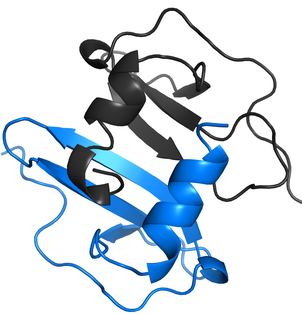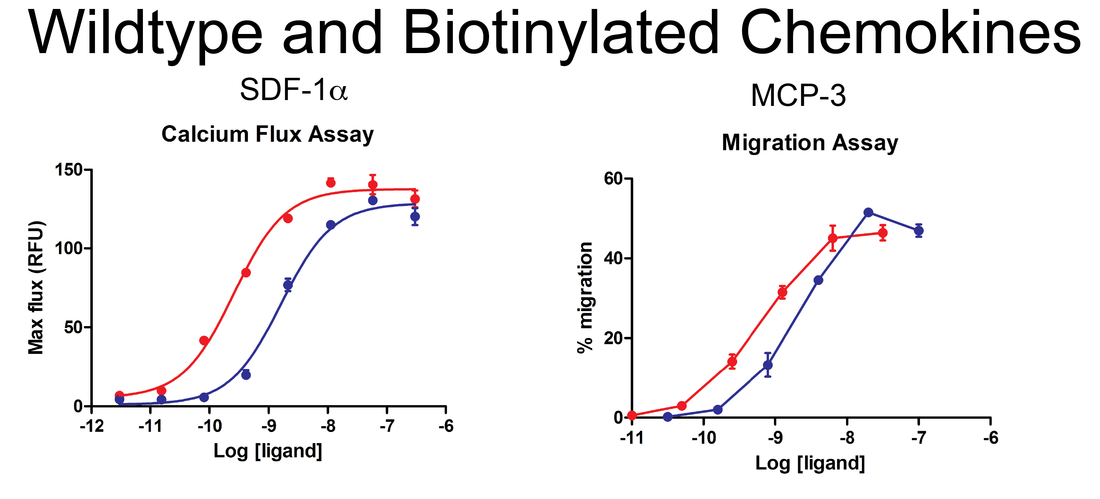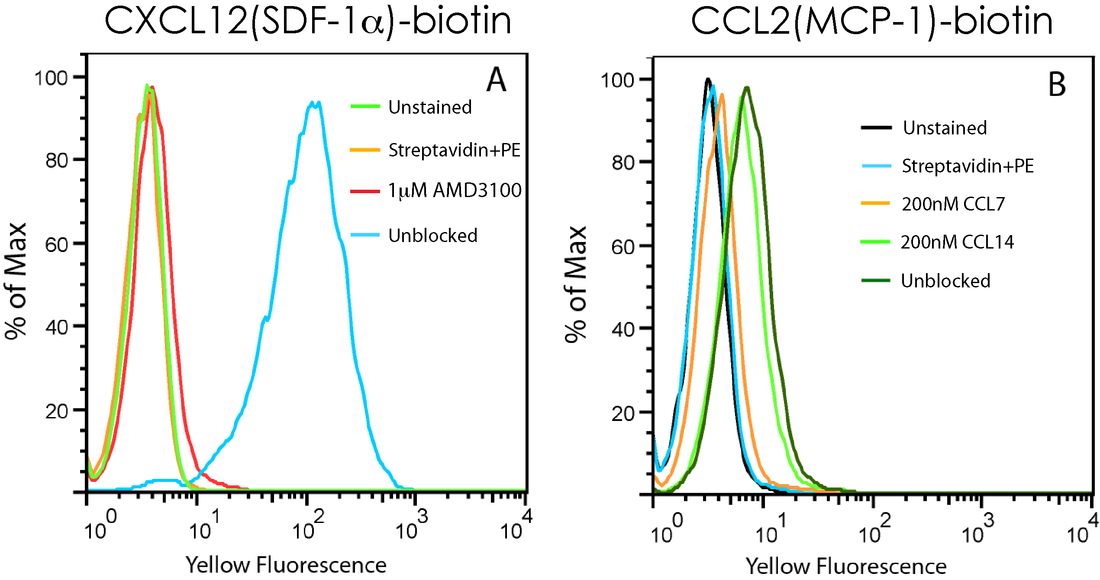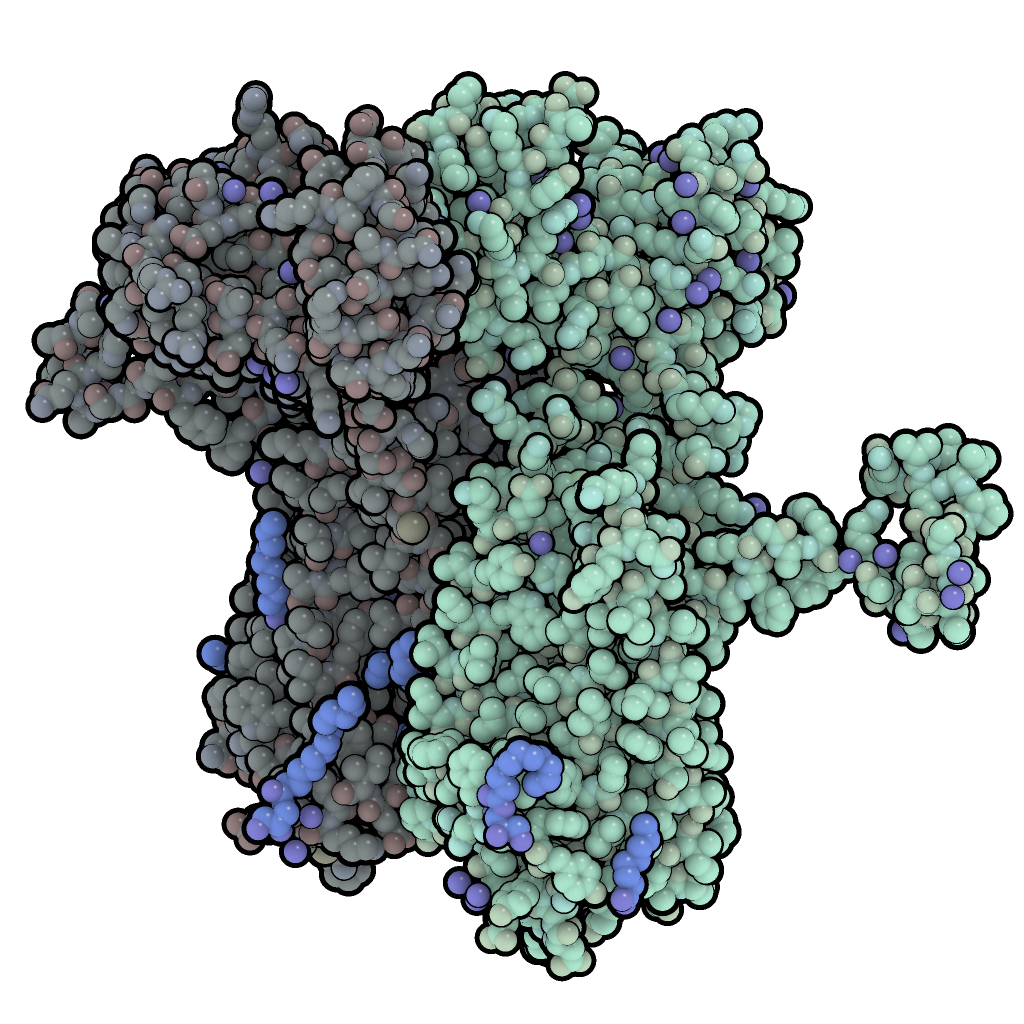Advancing Research with
High-Quality Chemokine Reagents
ChemoTactics proudly produces recombinant biotinylated chemokine protein reagents for various research entities.
We specialize in bulk production (>1mg) and offer flexible sizing.
Chemokines are small secreted signaling proteins responsible for the process of cell movement called chemotaxis. They act as chemical messengers, guiding immune cells to specific sites in the body where they are needed to combat infections or address tissue damage. Chemokines also help regulate the movement and recruitment of immune cells, contributing to the body's defense mechanisms and overall immune function.
ChemoTactics specializes in producing biotinylated chemokines for various applications and assay design.
ChemoTactics specializes in producing biotinylated chemokines for various applications and assay design.
ChemoTactics produces fully functional recombinant chemokine proteins for research use.
Contact us at [email protected] or 858-412-0485
for large scale and custom inquiries
Proudly made in the USA
for large scale and custom inquiries
Proudly made in the USA
We validate each product by conducting rigorous testing to ensure quality
|
U937 cells expressing endogenous CXCR4 were stimulated with increasing concentrations of SDF-1α after a 90-minute incubation with calcium dye at 37oC. The maximum response was plotted as a function of the ligand concentration (Red: wild type; Blue: biotinylated).
|
Cells expressing recombinant CCR2 were assayed for migration through a transwell bare filter at various concentrations of MCP-3. The responses are expressed as the % of total input cells (Red: wild type; Blue: biotinylated).
|
Create Custom Assays with
Biotinylated Chemokines
Flow Cytometry with Biotinylated Chemokines
|
A. Uptake of 20nM CXCL12-biotin by U937 cells in the presence (red trace) and absence (cyan) of a CXCR4 inhibitor, AMD 3100. U937 cells are not stained by streptavidin-PE in the absence of CXCL12-biotin (orange).
|
B. Uptake of 20nM CCL2-biotin by THP1 cells (dark green trace) is abolished by the addition of CCL7 (orange) but not CCL14 (light green), suggesting a CCR2-specific internalization. THP1 cells are not stained in the absence of CCL2-biotin (cyan).
|
Institutes using our chemokines
|
Cold Spring Harbor Labs, NY, USA
Bristol Myers Squib, USA UC San Diego, CA USA Hannover Medical Center, Germany The Moores Cancer Center, CA USA The Scripps Research Institute (TSRI) La Jolla, CA USA University of Piedmont, Italy Regeneron, USA Sanford Consortium for Regenerative Medicine, CA USA Genentech, USA University of Utah, UT USA University of Monash, Australia University of Houston, TX USA UC Berkley, CA USA Tel Aviv University, Israel Pfizer Global R & D, USA University of Georgia, GA USA NIBST, United Kingdom Case Western Reserve University, USA Merck Serono Geneva Research Center, Switzerland Department of Veterans Affairs Medical Center, USA Uppsala University, Sweden Plus Many More |
Publications with Chemokines Produced by ChemoTactics
- Pisani, A., Donno, R., Valenti, G., Pompa, P. P., Tirelli, N., & Bardi, G. (2022). Chemokine-decorated nanoparticles target specific subpopulations of primary blood mononuclear leukocytes. Nanomaterials, 12(20), 3560. https://doi.org/10.3390/nano12203560
- Pisani, A.; Donno, R.; Gennari, A.; Cibecchini, G.; Catalano, F.; Marotta, R.; Pompa, P.P.; Tirelli, N.; Bardi, G. CXCL12-PLGA/Pluronic Nanoparticle Internalization Abrogates CXCR4-Mediated Cell Migration. Nanomaterials 2020, 10, 2304. https://doi.org/10.3390/nano10112304
- Wang Z, Moresco P, Yan R, Li J, Gao Y, Biasci D, Yao M, Pearson J, Hechtman JF, Janowitz T, Zaidi R, Weiss MJ, Fearon DT. Carcinomas assemble a filamentous CXCL12-keratin-19 coating that suppresses T cell-mediated immune attack. PNAS Jan 2022 Vol. 119 No. 4. https://doi.org/10.1073/pnas.2119463119
- Chatterjee, T., Johnson-Buck, A. Walter, NG. Highly sensitive protein detection by aptamer-based single-molecule kinetic fingerprinting. Biosensors and Bioelectronics. Vol 216 15 Nov 2022. https://doi.org/10.1016/j.bios.2022.114639
- Zhikai Wang, Ran Yan, Jiayun Li, Ya Gao, Philip Moresco, Min Yao, Jaclyn F. Hechtman, Matthew J. Weiss, Tobias Janowitz, Douglas T. Fearon. Pancreatic cancer cells assemble a CXCL12-keratin 19 coating to resist immunotherapy. bioRxiv 776419; doi: https://doi.org/10.1101/776419. Posted: September 4, 2020
- Torretta S., Colombo G., Travelli C, Boumya S., Lim D., Genazzani A., Brolla A. The Cytokine Nicotinamide Phosphoribosyltransferase (eNAMPT; PBEF; Visfatin) Acts as a Natural Antagonist of C-C Chemokine Receptor Type 5 (CCR5). Cells 2020 Feb; 9(2):496. doi 10.3390/cells9020496 PMID: 32098202
- Wu, B., Chien, E.Y., Mol, C.D., Fenalti, G., Liu, W., Katritch, V., Abagyan, R., Brooun, A., Wells, P., Bi, F.C., Hamel, D.J., Kuhn, P., Handel, T.M., Cherezov, V., Stevens, R.C. Structures of the CXCR4 chemokine GPCR with small-molecule and cyclic peptide antagonists. Science, 2010. 330: 1066-1071. PMID: 20929726
- Ervin E. Kara, Iain Comerford, Cameron R. Bastow, Kevin A. Fenix, Wendel Litchfield, Tracey M. Handel, and Shaun R. McColl. Distinct chemokine receptor axes regulate T helper 9 cell trafficking to allergic and autoimmune inflammatory sites. J Immunol., 191:1110-1117, 2013. PMID: 23797668
- M. O'Hayre, C.L. Salanga, T.J. Kipps, D. Messmer, P.C. Dorrestein, T.M. Handel (2010) Elucidating the CXCL12/CXCR4 Signaling Network in Chronic Lymphocytic Leukemia through Phosphoproteomic Analysis. PLoS One. 5:e11716. PMID:
20661426 - T.M. Handel, Z. Johnson, M. Mack, R. Cirillo, V. Muzio, M. Teixiera, M. Déruaz, F. Borlat, T.N.C. Wells, and A.E.I. Proudfoot (2008). An Engineered Monomer of CCL2 has Anti-inflammatory Properties Emphasizing the Importance of Oligomerization for Chemokine Activity In Vivo. J Leukocyte Biology. 84(4):1101-8. PMID: 18662971
We Ship Fast World-Wide
|
Purchase directly from our product pages or request a quote.
|
Product Catalog
Product Catalog Contents
Request a catalog by contacting us today
- ChemoTactics Introduction and Background Information
- Learn about the various types of assays biotinylated chemokines can be used in
- Updated Product and Pricing List
- Detailed product descriptions
- Chemokine Assay Protocols
- Purchasing Conditions and Distributor Information
Request a catalog by contacting us today
This website uses marketing and tracking technologies. Opting out of this will opt you out of all cookies, except for those needed to run the website. Note that some products may not work as well without tracking cookies.
Opt Out of Cookies






